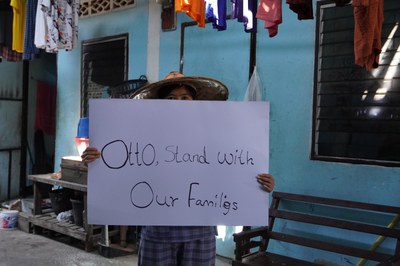Migrant workers who made clothes for an Otto supplier deprived of wages
In April 2020, in the wake of the COVID-19 pandemic, management at the Royal Knitting factory in Thailand dismissed Hnin Hnin*, and another 208 workers, without notice, unlawfully denying them wages for work done as well as severance pay. Over 90% of the affected workers are women from Myanmar.
"I want to tell Otto that we had been working for 10 years’, says Hnin Hnin, a migrant garment worker from Myanmar who made clothes for Otto brands at the Royal Knitting factory in Thailand. "We've been damaged and feel hopeless. But we don’t want a lot, just help to get the compensation we are owed."
Almost five years later, and despite a ruling from the Thai authorities against Royal Knitting, the 209 workers are still waiting for over $1,000,000 in unpaid wages and severance.
"When the factory closed, our lives were ruined. Since losing our jobs, my husband and I eat two meals a day", says Yee, another former garment worker.
With Royal Knitting refusing to pay, and little scope for enforcing the ruling, the workers turned to Otto for support, a family business and household name in Germany.
Otto seems to position itself as a leader in human rights due diligence, claiming on its website to ‘take responsibility for our actions along the entire value chain1’. Yet the company has failed to support the workers in resolving this case, demasking such statements as mere rhetoric.
The Clean Clothes Campaign has collected multiple, and consistent, testimonies from the workers that they were producing clothes for Otto. Yet Otto maintains that its garments were not being produced at the Royal Knitting factory at the time of the workers’ dismissal. The group claims that its business relationship with the factory ended in 20172, and thereafter its garments were produced at another factory owned by Royal Knitting’s parent company, Yamaken Apparel.
But the former Royal Knitting workers have shared with us packing lists and instructions they used to produce clothes for Otto after 2017 - and these match with shipping orders sent to us by Otto. Workers have also shared clothing labels of Otto brands - such as Rick Cardona and Ambria - that they were stitching on garments prior to their dismissal in 2020.
"My child used to drink milk often, but now she doesn’t get much", says Yee. Since losing their jobs at the factory, in an effort to ensure that rent, bills, and other basic needs are covered, Yee and her husband are now steeped in debt. Yee is just one of a third of the workers with children, and who is struggling to make ends meet after her dismissal.
The Clean Clothes Campaign have been consistently asking Otto to use its leverage to encourage its supplier to give effect to the Thai court ruling and pay the workers. If that is unsuccessful, we urge the company to provide the workers with their legally owed wages and severance compensation, which Royal Knitting did not pay.
Instead of taking responsibility, Otto chose to threaten us with legal action. When CCC Germany first published information about this case in May last year, Otto quickly issued cease and desist letters, alleging defamation. This measure intimidated the workers and the organisations supporting them, making them frightened to speak out publicly.
The Clean Clothes Campaign is now preparing a complaint to the due diligence mechanism of the Federal Office of Economics and Export Control in Germany, on behalf of the workers. The complaint claims that Otto has, to date, failed to remedy what happened to these workers, which shows a lack of compliance with the company's human rights obligations under the German Supply Chain Act.
On 19 February, the Clean Clothes Campaign will be holding a webinar, where attendees will hear from affected workers and the MAP Foundation, our partner organisation in Thailand that has been leading this case. Sign up for the webinar here.
For more information, including testimonies from the workers, please contact Priscilla Dudhia at priscilla@cleanclothes.org / +44 7869 147 248
*All names of migrant workers in this press release have been changed for their safety.
UPDATE ON 27TH FEBRUARY:
Please find a recording of the webinar here and some FAQs here with further information about the case and the complaint.
1 https://www.Ottogroup.com/en/nachhaltigkeit/working-conditions.php
2 https://www.business-humanrights.org/en/latest-news/Otto-groups-response
